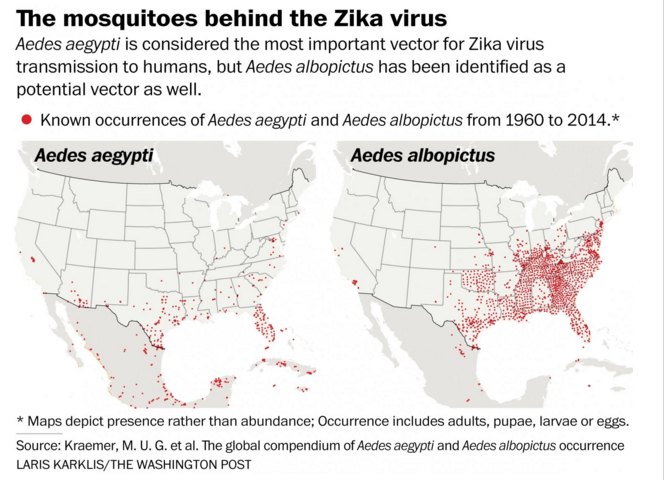The World Health Organization is extremely concerned over the Zika virus and its explosive spread through out the Americas. Carried by infected mosquitoes, the virus is transferred via a bite. Combating the mosquito population is one tactic to fight the spread, but not all of them can be exterminiated.
The Zika virus spreads through bites from the mosquito Aedes aegypti, which also carries Dengue, yellow fever, and Chikungunya. The virus is common throughout Latin America and in the warmest parts of the rest of the hemisphere; only Canada and Chile lack an Aedes aegypti population. While medical experts long believed Zika to be a mild viral infection, with symptoms resembling a weaker Dengue fever, Zika appears to be extremely dangerous to pregnant women. Brazilian authorities have documented thousands of cases of pregnant women diagnosed with Zika giving birth to babies with microcephaly, a condition in which the baby is born with an abnormally small head. Children with microcephaly typically suffer severe mental damage
Though health officials in the United States say that the vast majority of those exposed to the virus in the U.S. never get sick, because of effective mosquito control, W.H.O. is sounding a greater alarm.
“This is something we really don’t know how to handle,” LSU’s Dr. Corey Hebert explained during a Thursday MSNBC interview. “To be able to exterminate all the mosquitos in the United States is not possible … so it’s something that’s going to be very scary.”
The concern for pregnant women has cause countries like El Salvador to encourage women to refrain from getting pregnant. Brazil is call up 220,000 soldiers to combat the spread of Zika:
Brazil has launched a door-to-door campaign executed by 220,000 soldiers to combat the spread of the Zika virus. The campaign launches as one of the nation’s largest newspapers reports that medical experts have recorded more than 4,000 cases of microcephaly in the nation.The Zika virus spreads through bites from the mosquito Aedes aegypti, which also carries Dengue, yellow fever, and Chikungunya. The virus is common throughout Latin America and in the warmest parts of the rest of the hemisphere; only Canada and Chile lack an Aedes aegypti population.
Zika Hits the US:
So far, experts are divided about what lies ahead for the United States. Nearly three dozen cases have been confirmed to date in 11 states and the District of Columbia, but CDC acknowledges that the number is growing rapidly. In each, the person was believed to have been infected while out of the country.
Fauci is playing down the potential for a significant eruption of Zika here. He notes that dengue and chikungunya, diseases transmitted by the same kinds of mosquitoes, are widespread in Latin America. But their foothold in the United States has been controlled, with only small clusters of cases.
“It is unlikely that we will have a major outbreak of Zika in this country,” Fauci said.
Yet, Peter Hotez, dean of the National School of Tropical Medicine at Baylor College of Medicine, has fears. He recalls spending much of 2014 insisting that the Ebola outbreak would not become a significant problem in the United States. But he gives no such assurance now.
“I think we’re in for real trouble in the United States,” he said, considering how swiftly Zika can spread. He focuses on conditions throughout the Gulf Coast, where stagnant water sources — in uncollected garbage, discarded tires, untended bird baths — can be ideal breeding grounds for mosquitoes much of the year.
“You’ve got to assume the worst-case scenario,” Hotez said.
Source: The New York Times, Breitbart, Washington Post
https://www.youtube.com/watch?v=N8kL32IOppo




You’re all whacked out of your fucking skulls. Shut up and do work, clown shoes!
Scary!!